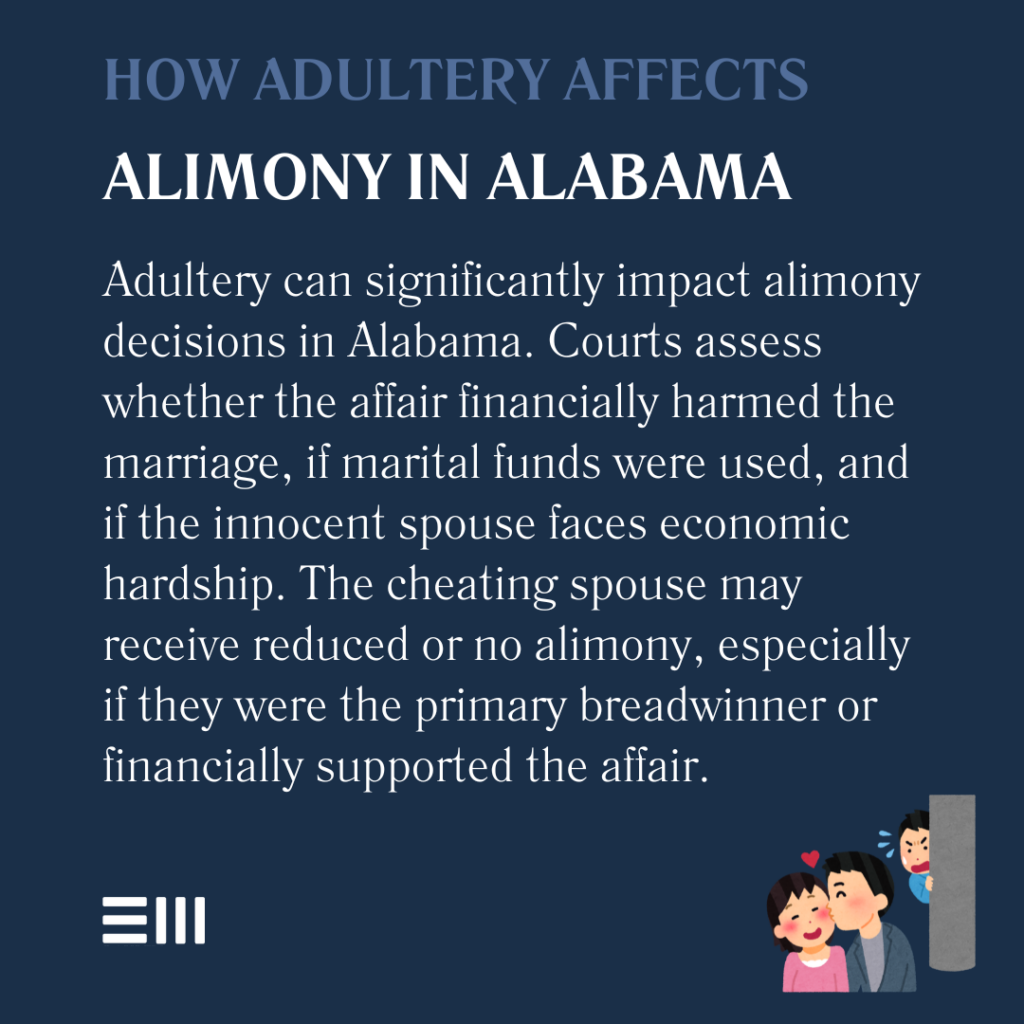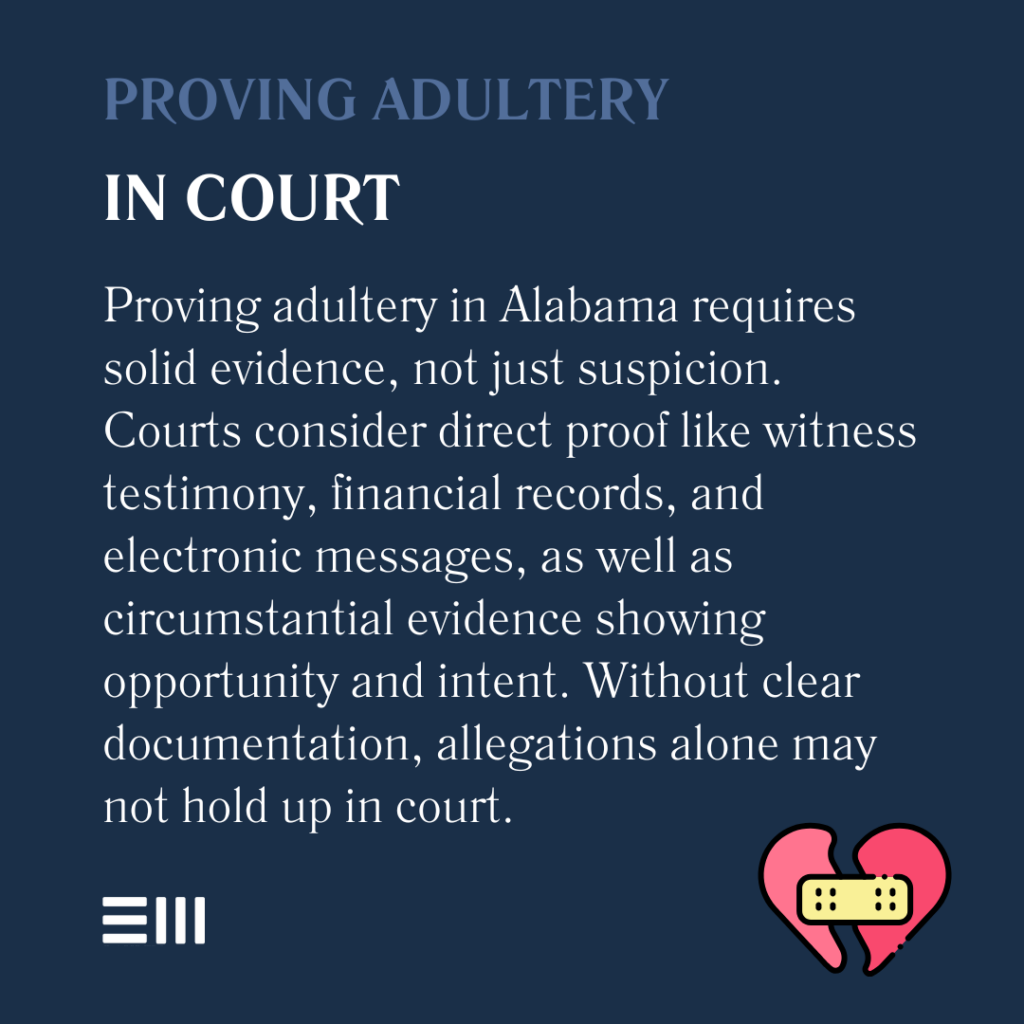
The discovery of infidelity often feels like a seismic shift, shattering the foundation of trust in a marriage.
While some couples work through this breach of trust, others find themselves navigating Alabama’s legal system to understand how adultery impacts their divorce proceedings.
Understanding these laws helps you make informed decisions about your future, whether you’re dealing with suspected infidelity or responding to accusations.
Legal Grounds for Divorce in Alabama
Before diving into adultery-specific provisions, understanding how adultery fits into Alabama’s broader divorce grounds provides important context.
Alabama recognizes both fault and no-fault grounds for divorce, with adultery being one of the most serious fault-based grounds.
Alabama courts recognize several grounds for divorce:
- Adultery;
- Abandonment;
- Imprisonment;
- Addiction to alcohol or drugs;
- Mental incapacity;
- Domestic violence;
- Incompatibility; and
- Irretrievable breakdown of marriage.
Each ground carries different implications for the divorce process, with adultery often having the most significant impact on outcomes. Understanding these options helps you choose the most appropriate approach for your situation.
How Alabama Law Defines Adultery
Alabama’s legal system takes a specific approach to defining and proving adultery in divorce cases. Understanding these definitions helps establish the groundwork for building your case or defending against allegations.
Adultery in Alabama divorce law encompasses:
- Voluntary sexual intercourse between a married person and someone other than their spouse;
- Both single instances and ongoing affairs;
- Physical acts rather than emotional relationships;
- Acts occurring before separation or divorce filing; and
- Evidence that meets specific legal standards.
These definitions shape how courts approach adultery cases and determine their impact on divorce proceedings. Courts require clear evidence that meets established legal standards rather than relying on suspicions or circumstantial information.
Impact of Adultery on Property Division
Adultery can significantly influence how courts divide marital assets in Alabama. While the state generally follows equitable distribution principles, proven infidelity may alter the final settlement.
Key factors courts consider include:
- Financial costs of the affair;
- Use of marital funds for affair-related expenses;
- Impact on family businesses or joint ventures;
- Timing of asset transfers or unusual spending; and
- Overall economic consequences of the adultery.
Understanding these factors helps you prepare appropriate documentation and evidence for property division negotiations.
Alabama courts aim to reach fair settlements while considering how adultery may have affected the marriage’s financial situation.
Criminal Implications of Adultery
While rarely prosecuted, understanding the criminal aspects of adultery in Alabama provides important context for divorce proceedings. These laws can affect both legal strategy and negotiation positions.
Criminal considerations include:
- Alabama’s historical criminalization of adultery;
- Modern enforcement practices;
- Impact on divorce negotiations;
- Professional consequences;
- Public record implications;
- Use in civil proceedings; and
- Privacy concerns.
Though criminal prosecution is uncommon, awareness of these laws helps inform decision-making during divorce proceedings. These factors often influence settlement negotiations and court strategies.
Effect on Alimony Determinations
Adultery plays a particularly significant role in alimony decisions under Alabama law. The court’s approach to spousal support can shift dramatically when infidelity enters the equation.
Factors affecting alimony in adultery cases include:
- Whether the adulterous spouse was the primary breadwinner;
- Duration and timing of the affair;
- Financial impact of the adultery on the marriage;
- Both parties’ earning capacity;
- Length of the marriage;
- Standard of living during marriage; and
- Contribution to marital assets.
Each factor receives careful consideration as courts determine fair support arrangements. These determinations aim to balance accountability with practical financial needs.

Proving Adultery in Alabama Courts
Successfully proving adultery requires meeting specific evidentiary standards in Alabama courts. Understanding these requirements helps you build a stronger case while avoiding common pitfalls.
Essential elements of proof include:
- Direct evidence of sexual conduct;
- Circumstantial evidence showing opportunity and inclination;
- Documentation of suspicious financial transactions;
- Witness testimony;
- Electronic evidence (texts, emails, social media);
- Surveillance records (when legally obtained); and
- Credit card statements and travel records.
Gathering this evidence requires careful attention to legal boundaries and privacy laws. Working within these constraints ensures your evidence remains admissible in court.

Child Custody and Adultery
While adultery significantly impacts some aspects of divorce, its influence on child custody decisions in Alabama follows specific parameters in Alabama law. Courts prioritize children’s best interests above all other considerations.
Factors courts evaluate include:
- Impact of adultery on children’s well-being;
- Exposure of children to inappropriate situations;
- Stability of home environment;
- Parenting abilities of both spouses;
- Children’s emotional needs;
- Relationship with both parents; and
- Living arrangements post-affair.
These considerations help courts make custody determinations that serve children’s needs while accounting for family circumstances. The focus remains on creating stable, nurturing environments for children affected by divorce.
Frequently Asked Questions About Adultery and Divorce in Alabama
Understanding Alabama’s adultery laws raises many questions for those navigating divorce.
Here are answers to common concerns about how adultery affects divorce proceedings.
How Does Adultery Affect Divorce Timeline in Alabama?
Adultery can expedite divorce proceedings by establishing fault grounds, potentially bypassing waiting periods required for no-fault divorces.
Is Dating During Separation Considered Adultery?
Legal separation does not terminate marriage in Alabama, meaning intimate relationships during separation may qualify as adultery.
Can Social Media Evidence Prove Adultery?
Courts accept social media evidence when properly obtained and authenticated, though it typically requires additional supporting evidence.
Does Adultery Affect Military Divorce Proceedings?
Military service members face additional consequences for adultery under the Uniform Code of Military Justice, potentially affecting benefits and career.
Can I Be Denied Alimony if I Committed Adultery?
Courts may reduce or deny alimony to an adulterous spouse, particularly if marital assets were used to support the affair.
Statute of Limitations and Timing Considerations
Understanding when to file and how timing affects your case can significantly impact the outcome of an adultery-based divorce in Alabama. Proper timing can strengthen your position while delays might weaken it.
Key timing considerations include:
- No strict statute of limitations for filing adultery-based divorce;
- Evidence freshness and availability;
- Witness memory and willingness to testify;
- Financial record accessibility;
- Pattern establishment for ongoing affairs;
- Impact of delay on court perception; and
- Preservation of electronic evidence.
These timing factors can influence both the strength of your case and potential outcomes. Acting promptly while carefully gathering evidence often provides the strongest foundation for your case.
Protecting Your Future Starts Today
When infidelity disrupts your marriage, choosing the right path forward requires both emotional strength and legal guidance.
At Baxley Maniscalco, we understand the complex interplay between Alabama’s adultery laws and your unique circumstances.
Contact us for a confidential consultation to discuss your situation and explore your legal options. Our experienced team will help you navigate this challenging time with dignity and purpose.
Can't find what you're looking for? Search our site below.










